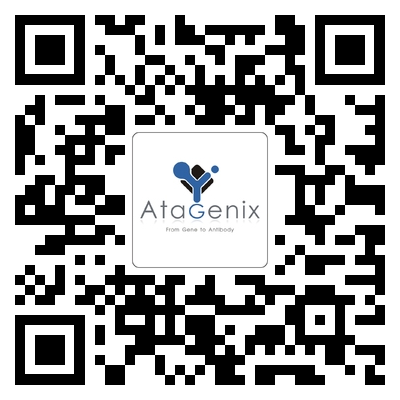普健生物(武汉)科技有限公司(AtaGenix)
Recombinant Human TNFSF11 protein ,C- His Tag


- 1
- 产品信息(Product Details)
- 前沿进展(Frontier progress)
- 如何订购
- 说明书
概述(Summary)icon
英文全称
Recombinant Human TNFSF11 protein ,C- His Tag
纯度(Purity)
>90% as determined by SDS-PAGE
内毒素(Endotoxin level)
Please contact with the lab for this information.
蛋白构建(Construction)
A DNA sequence encoding the human TNFSF11(Tyr69-Asp317) was fused with the C-terminal His Tag
Accession #
O14788
表达宿主(Host)
Mammalian cells
种属(Species)
Homo sapiens (Human)
预测分子量(Predicted Molecular Mass)
27.39kDa
制剂(Formulation)
Supplied as solution form in PBS or lyophilized from PBS .
运输方式(Shipping)
In general, proteins are provided as lyophilized powder/frozen liquid. They are shipped out with dry ice/blue ice unless customers require otherwise.
稳定性&储存(Stability &Storage)
Use a manual defrost freezer and avoid repeated freeze thaw cycles.
Store at 2 to 8 °C for one week .
Store at -20 to -80 °C for twelve months from the date of receipt.
Store at 2 to 8 °C for one week .
Store at -20 to -80 °C for twelve months from the date of receipt.
复溶(Reconstitution)
Reconstitute in sterile water for a stock solution.A copy of datasheet will be provided with the products, please refer to it for details.
电泳图(SDS-PAGE image)icon
背景(Background)icon
背景介绍
Receptor activator of nuclear factor kappa-B ligand (RANKL), also known as tumor necrosis factor ligand superfamily member 11 (TNFSF11), TNF-related activation-induced cytokine (TRANCE), osteoprotegerin ligand (OPGL), and osteoclast differentiation factor (ODF), is known as a type II membrane protein and is a member of the tumor necrosis factor (TNF) superfamily. RANKL, through its ability to stimulate osteoclast formation and activity, is a critical mediator of bone resorption and overall bone density. Some findings also suggestion some cancer cells, particularly prostate cancer cells, can activate an increase in bone remodeling and ultimately increase overall bone production.[17] This increase in bone remodeling and bone production increases the overall growth of bone metastasizes. The overall control of bone remodeling is regulated by the binding of RANKL with its receptor or its decoy receptor, respectively, RANK and OPG.
分子别名(Alternative Names)
RANKL,CD254,TRANCE,OPGL,ODF
参考文献(References)
Fan, Gu, Pan, Dai, Zou, Gao, Zhang (2020) Association of Genetic Polymorphisms in TNFRSF11 with the Progression of Genetic Susceptibility to Gastric Cancer Journal of oncology 2020() 4103264
Noteicon
For research use only .
To investigate the relationship between polymorphism of TNFRSF11 gene rs9533156 and rs2277438 and susceptibility to gastric cancer. A case-control study was conducted to select 577 cases of primary gastric cancer and 678 cases of normal control. We extracted whole blood genomic DNA and amplified the target gene fragment by PCR. The genotyping and allele were tested through the snapshot method. In this case-control study, we observed that there was a difference in the genotype distribution of TNFRSF11 gene rs9533156 between the case group and the control group. The frequency distribution of TC heterozygous mutation in the case group was higher than that in the control group. The smoking rate in the case group (34.49%) was higher than that in the control group (27.29%), and the difference in frequency distribution between the two groups was statistically significant (P=0.006). Our findings suggest that TNFRSF11 rs9533156 is associated with susceptibility to GC, which is more evident among elderly patients (>62 years), nonsmokers, and patients who do not consume alcohol. The analysis of the relationship between the TNFSF11 gene rs9533156 site variant and clinical factors of gastric cancer showed that, compared with the tumor size <2 cm group, patients with tumor size ≥2 cm and whom carrying rs9533156 site mutations had a higher frequency distribution, and the difference was statistically significant (P=0.022). Compared with the nonhyperglycemic group, the frequency distribution of patients with rs9533156 site mutations in the diabetes group was higher, and the difference was statistically significant (P <0.001). This study shows that there is a correlation between smoking and the occurrence of gastric cancer. Based on our research, the functional SNP TNFRSF11 TC genotype may be an indicator of individual susceptibility to GC. The mutation at rs9533156 may be related to the size of gastric cancer. The mutation rate of rs9533156 of TNFSF11 gene is higher in diabetic gastric cancer patients.
1搜索商品:关键字搜索;分类导航搜索;产品联系:手机/微信同号:15972188750,座机:027-65279366(推荐 !)
2产品选购:确定好产品信息与规格,向产品客服询问底价
3提交订单:向客服提交收货人信息,选择送货方式,支付方式,发票信息
4产品发货:发票随产品一起发送,耐心等待收货即可
质量保证:
所售产品均经过严格的质量检验,确保所供产品的技术指标与生产厂家的目录、说明书、质检报告上的描述一致,请放心选购。
质量与免责说明:
买方验收产品时,如发现产品短缺、不匹配、包装破损等情况,请保持产品原包装状态,并在收货七个工作日内,以书面方式向我司提出异议。逾期未提出异议视为合格。
买方保管产品时,应按照产品标签、说明书所示保管条件保存,如系保管不当导致产品质量问题,恕不受理。
买方使用产品时。如发现产品质量问题,应在使用初期提出,而非在使用完或快使用完时提出,以备我司回收产品,确认产品质量。如确属质量问题,我司负责调换或退货。发生索赔事宜,我司将在产品价格额度范围内酌情赔偿,恕不受理超出产品本身价值之部分。自收货之日起,超过三个月未反映产品问题,恕不退换。
我司所提供的产品仅限于专业人士的科学研究使用,不得用于临床诊断或者治疗,若有单位或者个人擅自改变我司产品用途,我司不承担任何责任。
普健生物(武汉)科技有限公司(AtaGenix) 鄂ICP备15005566号-1
Copyright © 2024 Lawyer Theme All Rights Reserved
Copyright © 2024 Lawyer Theme All Rights Reserved









